【C++】封装红黑树实现map和set
1. 源码及框架分析
SGI-STL30版本源代码,map和set的源代码在map/set/stl_map.h/stl_set.h/stl_tree.h等几个头文件 中。 map和set的实现结构框架核心部分截取出来如下:
// set
#ifndef __SGI_STL_INTERNAL_TREE_H
#include <stl_tree.h>
#endif
#include <stl_set.h>
#include <stl_multiset.h>
// map
#ifndef __SGI_STL_INTERNAL_TREE_H
#include <stl_tree.h>
#endif
#include <stl_map.h>
#include <stl_multimap.h>
// stl_set.h
template <class Key, class Compare = less<Key>, class Alloc = alloc>
class set {
public:
// typedefs:
typedef Key key_type;
typedef Key value_type;
private:
typedef rb_tree<key_type, value_type,
identity<value_type>, key_compare, Alloc> rep_type;
rep_type t; // red-black tree representing set
};
// stl_map.h
template <class Key, class T, class Compare = less<Key>, class Alloc = alloc>
class map {
public:
// typedefs:
typedef Key key_type;
typedef T mapped_type;
typedef pair<const Key, T> value_type;
private:
typedef rb_tree<key_type, value_type,
select1st<value_type>, key_compare, Alloc> rep_type;
rep_type t; // red-black tree representing map
};
// stl_tree.h
struct __rb_tree_node_base
{
typedef __rb_tree_color_type color_type;
typedef __rb_tree_node_base* base_ptr;
color_type color;
base_ptr parent;
base_ptr left;
base_ptr right;
};
// stl_tree.h
template <class Key, class Value, class KeyOfValue, class Compare, class Alloc
= alloc>
class rb_tree {
protected:
typedef void* void_pointer;
typedef __rb_tree_node_base* base_ptr;
typedef __rb_tree_node<Value> rb_tree_node;
typedef rb_tree_node* link_type;
typedef Key key_type;
typedef Value value_type;
public:
// insert用的是第二个模板参数左形参
pair<iterator, bool> insert_unique(const value_type& x);
// erase和find用第一个模板参数做形参
size_type erase(const key_type& x);
iterator find(const key_type& x);
protected:
size_type node_count; // keeps track of size of tree
link_type header;
};
template <class Value>
struct __rb_tree_node : public __rb_tree_node_base
{
typedef __rb_tree_node<Value>* link_type;
Value value_field;
};• set和map分别是key和key-value两种模型,按照一般的思路,我们似乎需要实现两套模版但是通过下图对框架的分析,底层红黑树实现时,我们可以看到源码中rb_tree用了一个巧妙的泛型思想实现,rb_tree是实现key的搜索场景,还是key/value的搜索场景不是直接写死的,而是由第二个模板参数Value决定_rb_tree_node中存储的数据类型(Value这里只是名字命名的问题与key-value无关。)。 • rb_tree底层不确定Value类型,但是上层知道,set实例化rb_tree时第二个模板参数给的是key,map实例化rb_tree时第二个模板参数给的是pair<const key, T>,这样一颗红黑树既可以实现key搜索场景的set,也可以实现key/value搜索场景的map。
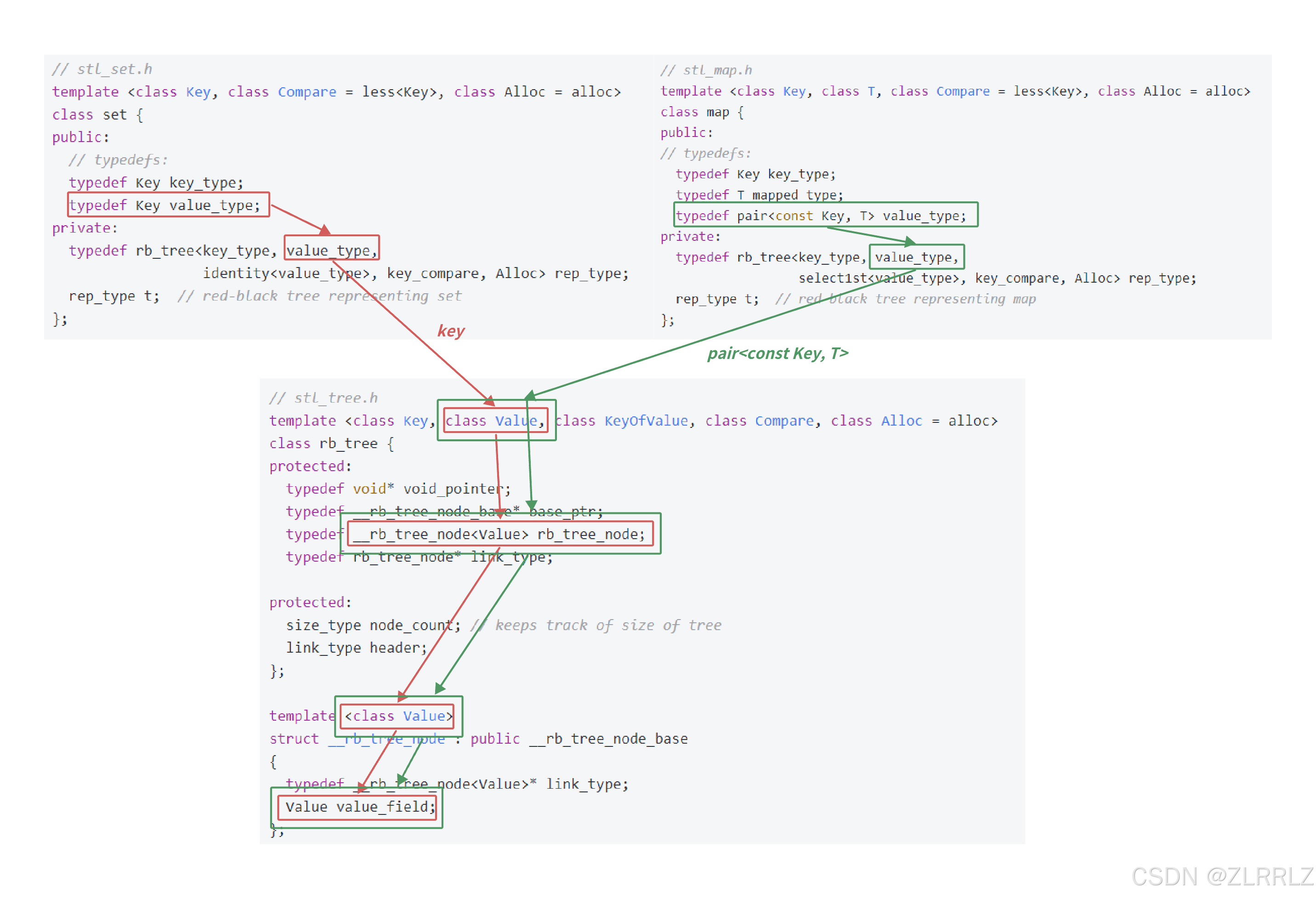
• 要注意一下,源码里面模板参数是用T代表value,而内部写的value_type不是我们我们日常key/value场景中说的value,源码中的value_type反而是红黑树结点中存储的真实的数据的类型。 • 那在rb_tree第二个模板参数Value已经控制了红黑树结点中存储的数据类型的情况下,为什么还要传第一个模板参数Key呢? 尤其是set,两个模板参数实例化之后是一样的,这是很多读者这时的一个疑问。 要注意的是对于map和set,find/erase封装时的函数参数都是Key,所以第一个模板参数是传给find/erase等函数做形参的类型的。对于set而言两个参数是一样的,但是对于map而言就完全不一样了,map 的insert的是Value实例化之后的pair对象,但是find和ease的是Key对象。所以模版参数Key的存在主要解决的是map的find/erase的函数参数问题
2. 模拟实现map和set
2.1 实现出复用红黑树的框架,并支持insert
• 参考源码框架,map和set复用之前我们实现的红黑树(相关细节不了解的可以翻阅前文红黑树的文章)。 •源码的模版参数命名与key-value模型冲突,所以我们这里相比源码调整一下,key参数就用K,value参数就用V,红黑树中的数据类型,我们使用T。 • 其次因为RBTree实现了泛型,所以在内部封装实现具体功能函数时,我们无法从内部根据参数确定T参数到底是K,还是pair<K, V>,那么insert内部进行插入逻辑比较时,就没办法进行比较,因为pair的默认支持的是key和value一起参与比较,我们需要时的任何时候只比较key,所以我们在map和set层分别实现一个MapKeyOfT和SetKeyOfT的仿函数传给RBTree的KeyOfT,然后RBTree中通过KeyOfT仿函数取出T类型对象中的key,再进行比较,具体细节参考如下代码实现。
// 源码中pair支持的<重载实现
template <class T1, class T2>
bool operator< (const pair<T1, T2>& lhs, const pair<T1, T2>& rhs)
{
return lhs.first < rhs.first || (!(rhs.first < lhs.first) &&
lhs.second < rhs.second);
}
// Mymap.h,map基本骨架
namespace zlr
{
template<class K, class V>
class map
{
struct MapKeyOfT//取出key的仿函数
{
const K& operator()(const pair<K, V>& kv)
{
return kv.first;
}
};
public:
bool insert(const pair<K, V>& kv)
{
return _t.Insert(kv);
}
private:
RBTree<K, pair<K, V>, MapKeyOfT> _t;
};
}
// Myset.h,set基本骨架
namespace zlr
{
template<class K>
class set
{
struct SetKeyOfT//取出key的仿函数
{
const K& operator()(const K& key)
{
return key;
}
};
public:
bool insert(const K& key)
{
return _t.Insert(key);
}
private:
RBTree<K, K, SetKeyOfT> _t;
};
}
// RBTree.h
enum Colour
{
RED,
BLACK
};
template<class T>
struct RBTreeNode//红黑树节点
{
T _data;
RBTreeNode<T>* _left;
RBTreeNode<T>* _right;
RBTreeNode<T>* _parent;
Colour _col;
RBTreeNode(const T& data)
: _data(data)
, _left(nullptr)
, _right(nullptr)
, _parent(nullptr)
{
}
};
template<class K, class T, class KeyOfT>
class RBTree//红黑树封装
{
private:
typedef RBTreeNode<T> Node;
Node* _root = nullptr;
public:
bool Insert(const T& data)
{
if (_root == nullptr)
{
_root = new Node(data);
_root->_col = BLACK;
return true;
}
KeyOfT kot;
Node* parent = nullptr;
Node* cur = _root;
while (cur)
{
if (kot(cur->_data) < kot(data))
{
parent = cur;
cur = cur->_right;
}
else if (kot(cur->_data) > kot(data))
{
parent = cur;
cur = cur->_left;
}
else
{
return false;
}
}
cur = new Node(data);
Node* newnode = cur;
// 新增结点。颜色给红色
cur->_col = RED;
if (kot(parent->_data) < kot(data))
{
parent->_right = cur;
}
else
{
parent->_left = cur;
}
cur->_parent = parent;
//...
return true;
}
}2.2 支持iterator的实现
库中iterator核心源代码
struct __rb_tree_base_iterator
{
typedef __rb_tree_node_base::base_ptr base_ptr;
base_ptr node;
void increment()
{
if (node->right != 0) {
node = node->right;
while (node->left != 0)
node = node->left;
}
else {
base_ptr y = node->parent;
while (node == y->right) {
node = y;
y = y->parent;
}
if (node->right != y)
node = y;
}
}
void decrement()
{
if (node->color == __rb_tree_red &&
node->parent->parent == node)
node = node->right;
else if (node->left != 0) {
base_ptr y = node->left;
while (y->right != 0)
y = y->right;
node = y;
}
else {
base_ptr y = node->parent;
while (node == y->left) {
node = y;
y = y->parent;
}
node = y;
}
}
};
template <class Value, class Ref, class Ptr>
struct __rb_tree_iterator : public __rb_tree_base_iterator
{
typedef Value value_type;
typedef Ref reference;
typedef Ptr pointer;
typedef __rb_tree_iterator<Value, Value&, Value*> iterator;
__rb_tree_iterator() {}
__rb_tree_iterator(link_type x) { node = x; }
__rb_tree_iterator(const iterator& it) { node = it.node; }
reference operator*() const { return link_type(node)->value_field; }
#ifndef __SGI_STL_NO_ARROW_OPERATOR
pointer operator->() const { return &(operator*()); }
#endif /* __SGI_STL_NO_ARROW_OPERATOR */
self& operator++() { increment(); return *this; }
self& operator--() { decrement(); return *this; }
inline bool operator==(const __rb_tree_base_iterator& x,
const __rb_tree_base_iterator& y) {
return x.node == y.node;
}
inline bool operator!=(const __rb_tree_base_iterator& x,
const __rb_tree_base_iterator& y) {
return x.node != y.node;
}iterator骨架
template<class T, class Ref, class Ptr>
struct RBTreeIterator
{
typedef RBTreeNode<T> Node;
typedef RBTreeIterator<T, Ref, Ptr> Self;
Node* _node;
Node* _root;
RBTreeIterator(Node* node, Node* root)
:_node(node)
, _root(root)
{
}
};由于需要找到树的根节点,我们这里创建指针管理下。
iterator实现思路分析
• iterator实现的大框架跟list的iterator思路是一致的,用一个类型封装结点的指针,再通过重载运算符实现,迭代器像指针一样访问的行为。 • 这里的难点是operator++和operator--的实现。根据泛型思想,对于封装我们希望能够摒弃底层的差异,因此迭代器这里我们希望++、--能像正常指针一样顺序遍历,map和set的迭代器走的是中序遍历,左子树->根结点->右子树,那么begin()会返回中序第一个结点的iterator也就是10所在结点的迭代器。
Iterator Begin()
{
Node* leftMost = _root;
while (leftMost && leftMost->_left)
{
leftMost = leftMost->_left;
}
return Iterator(leftMost, _root);
}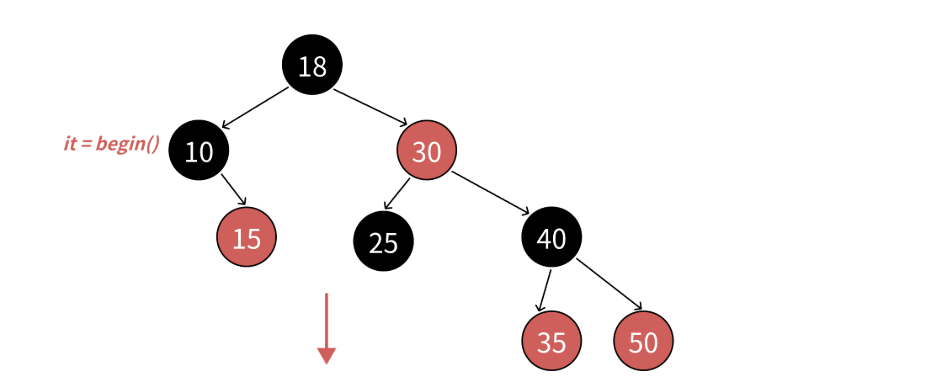
• 迭代器++的核心逻辑就是不看全局,只看局部,只考虑当前中序局部要访问的下一个结点。 • 迭代器++时,如果it指向的结点的右子树不为空,代表当前结点已经访问完了,要访问下一个结点是右子树的中序第一个,一棵树中序第一个是最左结点,所以直接找右子树的最左结点即可。 • 迭代器++时,如果it指向的结点的右子树空,代表当前结点已经访问完了且当前结点所在的子树也访问完了,要访问的下一个结点在当前结点的祖先里面,所以要沿着当前结点到根的祖先路径向上找。 • 如果当前结点是父亲的右,根据中序左子树->根结点->右子树,当前当前结点所在的子树访问完了,当前结点所在父亲的子树也访问完了,那么下一个访问的需要继续往根的祖先中去找,直到找到孩子是父亲左的那个祖先就是中序要问题的下一个结点。如下图:it指向15,15右为空,15是10的右,15所在子树话访问完了,10所在子树也访问完了,继续往上找,10是18的左,那么下一个访问的结点就是18。
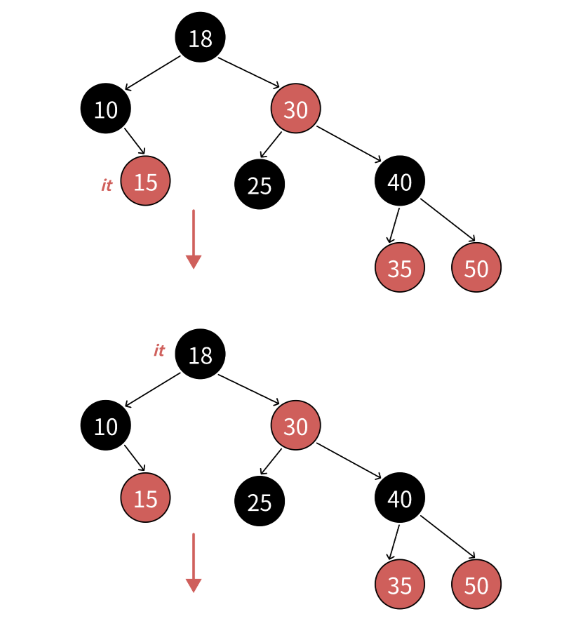
• 如果当前结点是父亲的左,根据中序左子树->根结点->右子树,那么下一个访问的结点就是当前结点的父亲;如下图:it指向25,25右为空,25是30的左,所以下一个访问的结点就是30。
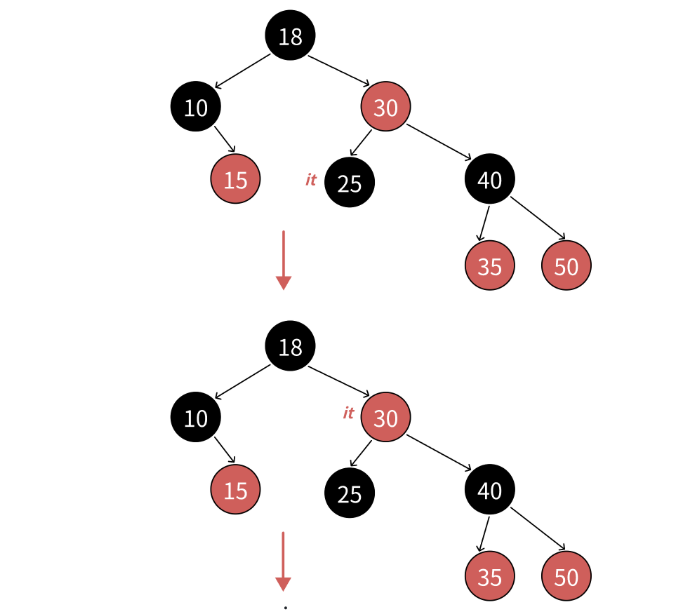
• end()如何表示呢?如下图:当it指向50时,++it时,50是40的右,40是30的右,30是18的右,18到根没有父亲,没有找到孩子是父亲左的那个祖先,这时父亲为空了,那我们就把it中的结点指针置为nullptr,我们用nullptr去充当end,这样子即使是空树,迭代器等于end(),也不会进循环,不会有问题。
Iterator End()
{
return Iterator(nullptr, _root);
}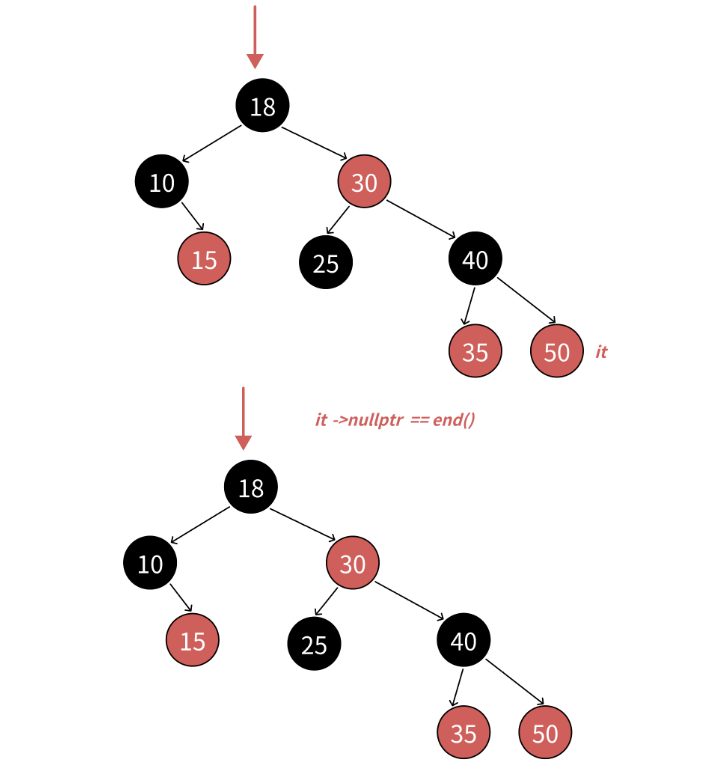
需要补充的是stl源码中相关的代码实现与我们这里不同,源码中红黑树增加了一个哨兵位头结点做为end()(对于这个节点颜色规定为红色),这哨兵位头结点和根互为父亲,左指向最左结点,右指向最右结点。相比我们用nullptr作为end(),差别不大,他能实现的,我们也能实现。只是--end()判断到结点时空,特殊处理一下,让迭代器结点指向最右结点。具体参考迭代器--实现。
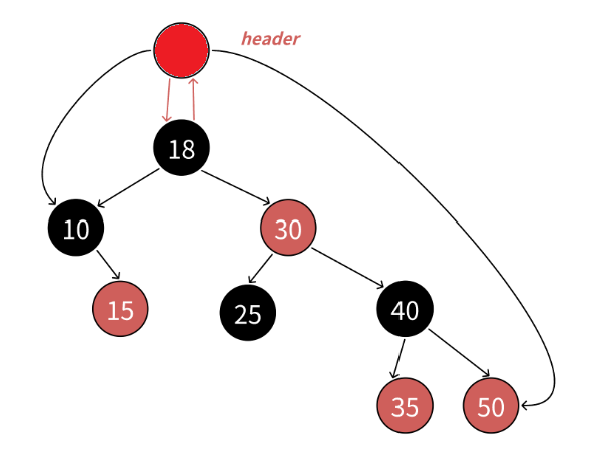
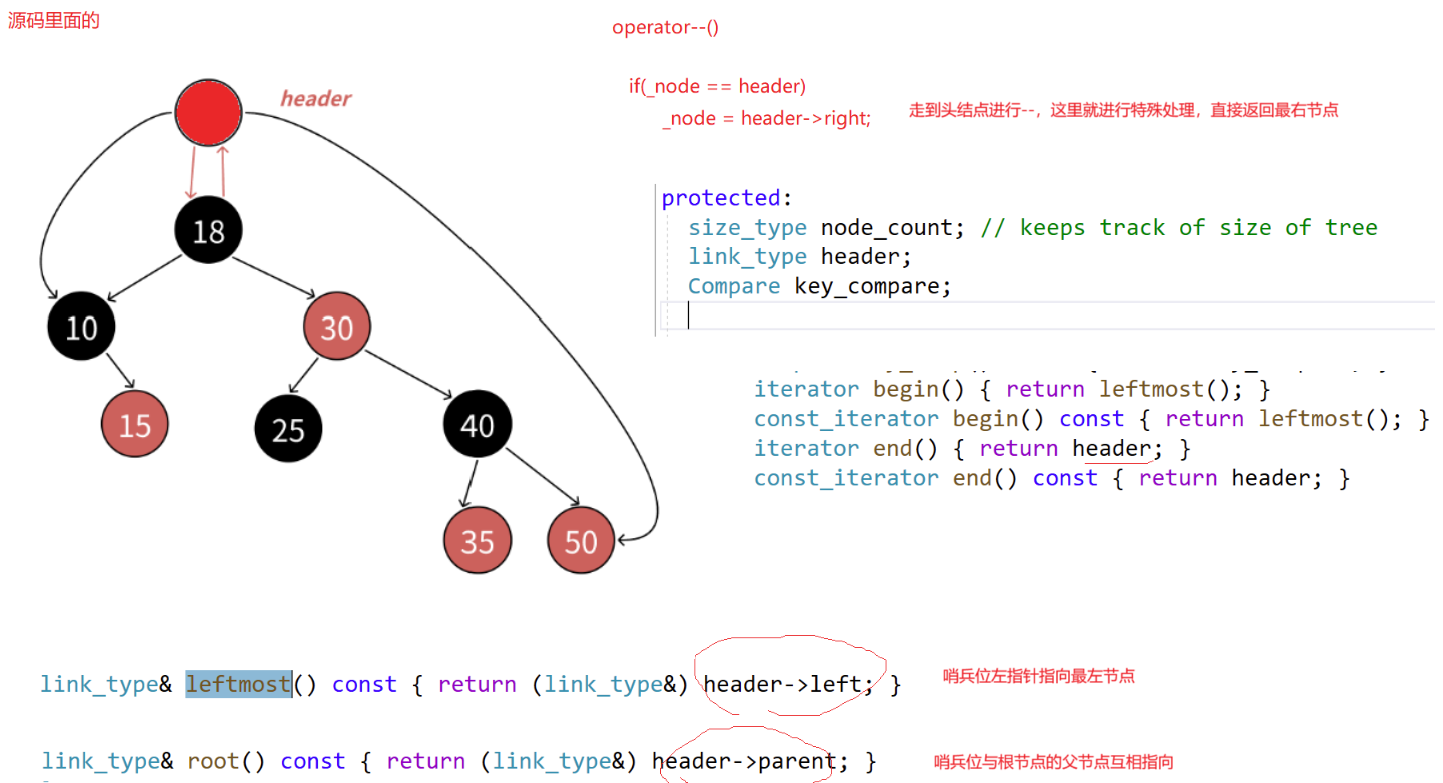
总的来说源码中的对--end()处理方便了我们找到根节点与最左和最右节点,但是在插入删除等情况下,还多出了更新根哨兵位左右指针的消耗
• 迭代器--的实现跟++的思路完全类似,逻辑正好反过来即可,因为他访问顺序是右子树->根结点->左子树,具体参考下面代码实现。
Self& operator--()
{
if (_node == nullptr) // end()
{
// --end(),特殊处理,走到中序最后一个结点,整棵树的最右结点
Node* rightMost = _root;
while (rightMost && rightMost->_right)
{
rightMost = rightMost->_right;
}
_node = rightMost;
}
else if (_node->_left)
{
// 左子树不为空,中序左子树最后一个
Node* rightMost = _node->_left;
while (rightMost->_right)
{
rightMost = rightMost->_right;
}
_node = rightMost;
}
else
{
// 孩子是父亲右的那个祖先
Node* cur = _node;
Node* parent = cur->_parent;
while (parent && cur == parent->_left)
{
cur = parent;
parent = cur->_parent;
}
_node = parent;
}
return *this;
}map和set的迭代器这里需要额外说明的是由于key-value模型的key不支持修改,value支持修改,迭代器const的问题上我们需要额外处理。 源码中set是直接使用const迭代器封装普通迭代器,来保证key不被修改,但是这种方式在层层传递参数时会出现问题,处理麻烦些,参考源码中map的处理,我们这里换种方式s。

• et的iterator不支持修改,所以我们把set的第二个模板参数改成const K即可, RBTree<K, const K, SetKeyOfT> _t; • map的iterator不支持修改key但是可以修改value,我们把map的第二个模板参数pair的第一个参数改成const K即可, RBTree<K, pair<const K, V>, MapKeyOfT> _t; 通过这种方式,传递参数,模版实例化后key就无法修改,value可以修改,处理相对简单。 需要注意的是下图中我们在set中定义内嵌类型是,模版参数K前也要对应加上const,否则会出现类型不一致导致报错。
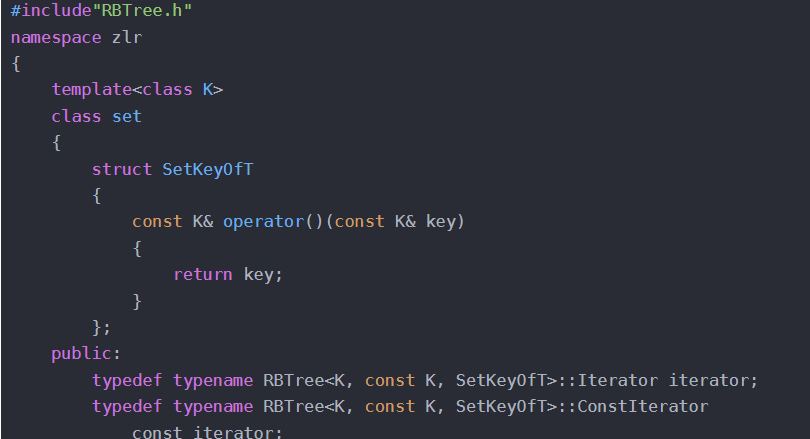
• 迭代器其他功能类似引用、解引用、比较是否相等类似之前容器迭代器的实现,我们返回迭代器的内部的数据即可,同样我们采用模版参数实例化来处理返回值是否const的问题。
Ref operator*()
{
return _node->_data;
}
Ptr operator->()
{
return &_node->_data;
}
bool operator!= (const Self& s) const
{
return _node != s._node;
}
bool operator== (const Self& s) const
{
return _node == s._node;
}2.3 map支持[]
• map要支持[]主要需要insert返回值支持,修改RBtree中的insert返回值为pair<Iterator, bool> Insert(const T& data),如果值树中有,会返回值的迭代器,如果没有,会进行插入,并返回结果 • 有了insert支持[]实现就很简单了,具体参考下面代码实现
pair<iterator, bool> insert(const pair<K, V>& kv)
{
return _t.Insert(kv);
}
V& operator[](const K& key)
{
pair<iterator, bool> ret = insert(make_pair(key, V()));
return ret.first->second;
}2.4 map和set代码完整实现代码
需要说明的是在map和set中定义内嵌类型(这里定义迭代器),因为编译器无法确定这里是类还是变量,我们这里需要typename注明告诉编译器这里是类型,使得代码可以通过编译器检查。
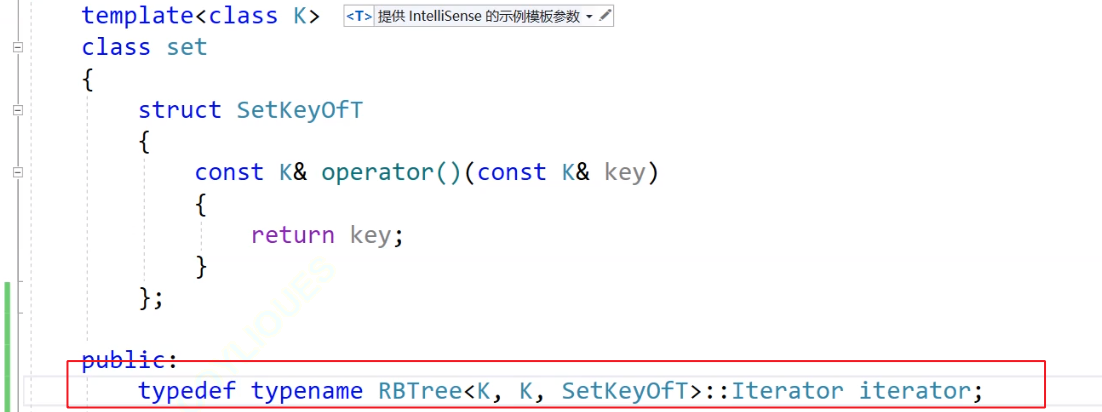
// Myset.h
#include"RBTree.h"
namespace zlr
{
template<class K>
class set
{
struct SetKeyOfT
{
const K& operator()(const K& key)
{
return key;
}
};
public:
typedef typename RBTree<K, const K, SetKeyOfT>::Iterator iterator;
typedef typename RBTree<K, const K, SetKeyOfT>::ConstIterator
const_iterator;
iterator begin()
{
return _t.Begin();
}
iterator end()
{
return _t.End();
}
const_iterator begin() const
{
return _t.Begin();
}
const_iterator end() const
{
return _t.End();
}
pair<iterator, bool> insert(const K& key)
{
return _t.Insert(key);
}
iterator find(const K& key)
{
return _t.Find(key);
}
private:
RBTree<K, const K, SetKeyOfT> _t;
};
void Print(const set<int>& s)
{
set<int>::const_iterator it = s.end();
while (it != s.begin())
{
--it;
// 不支持修改
//*it += 2;
cout << *it << " ";
}
cout << endl;
}
void test_set()
{
set<int> s;
int a[] = { 4, 2, 6, 1, 3, 5, 15, 7, 16, 14 };
for (auto e : a)
{
s.insert(e);
}
for (auto e : s)
{
cout << e << " ";
}
cout << endl;
Print(s);
}
}
// Mymap.h
#include"RBTree.h"
namespace zlr
{
template<class K, class V>
class map
{
struct MapKeyOfT
{
const K& operator()(const pair<K, V>& kv)
{
return kv.first;
}
};
public:
typedef typename RBTree<K, pair<const K, V>, MapKeyOfT>::Iterator
iterator;
typedef typename RBTree<K, pair<const K, V>, MapKeyOfT>::ConstIterator
const_iterator;
iterator begin()
{
return _t.Begin();
}
iterator end()
{
return _t.End();
}
const_iterator begin() const
{
return _t.Begin();
}
const_iterator end() const
{
return _t.End();
}
pair<iterator, bool> insert(const pair<K, V>& kv)
{
return _t.Insert(kv);
}
iterator find(const K& key)
{
return _t.Find(key);
}
V& operator[](const K& key)
{
pair<iterator, bool> ret = insert(make_pair(key, V()));
return ret.first->second;
}
private:
RBTree<K, pair<const K, V>, MapKeyOfT> _t;
};
void test_map()
{
map<string, string> dict;
dict.insert({ "sort", "排序" });
dict.insert({ "left", "左边" });
dict.insert({ "right", "右边" });
dict["left"] = "左边,剩余";
dict["insert"] = "插入";
dict["string"];
map<string, string>::iterator it = dict.begin();
while (it != dict.end())
{
// 不能修改first,可以修改second
//it->first += 'x';
it->second += 'x';
cout << it->first << ":" << it->second << endl;
++it;
}
cout << endl;
}
}
// RBtree.h
enum Colour
{
RED,
BLACK
};
template<class T>
struct RBTreeNode
{
T _data;
RBTreeNode<T>* _left;
RBTreeNode<T>* _right;
RBTreeNode<T>* _parent;
Colour _col;
RBTreeNode(const T& data)
: _data(data)
, _left(nullptr)
, _right(nullptr)
, _parent(nullptr)
{
}
};
template<class T, class Ref, class Ptr>
struct RBTreeIterator
{
typedef RBTreeNode<T> Node;
typedef RBTreeIterator<T, Ref, Ptr> Self;
Node* _node;
Node* _root;
RBTreeIterator(Node* node, Node* root)
:_node(node)
, _root(root)
{
}
Self& operator++()
{
if (_node->_right)
{
// 右不为空,右子树最左结点就是中序第一个
Node* leftMost = _node->_right;
while (leftMost->_left)
{
leftMost = leftMost->_left;
}
_node = leftMost;
}
else
{
// 孩子是父亲左的那个祖先
Node* cur = _node;
Node* parent = cur->_parent;
while (parent && cur == parent->_right)
{
cur = parent;
parent = cur->_parent;
}
_node = parent;
}
return *this;
}
Self& operator--()
{
if (_node == nullptr) // end()
{
// --end(),特殊处理,走到中序最后一个结点,整棵树的最右结点
Node* rightMost = _root;
while (rightMost && rightMost->_right)
{
rightMost = rightMost->_right;
}
_node = rightMost;
}
else if (_node->_left)
{
// 左子树不为空,中序左子树最后一个
Node* rightMost = _node->_left;
while (rightMost->_right)
{
rightMost = rightMost->_right;
}
_node = rightMost;
}
else
{
// 孩子是父亲右的那个祖先
Node* cur = _node;
Node* parent = cur->_parent;
while (parent && cur == parent->_left)
{
cur = parent;
parent = cur->_parent;
}
_node = parent;
}
return *this;
}
Ref operator*()
{
return _node->_data;
}
Ptr operator->()
{
return &_node->_data;
}
bool operator!= (const Self& s) const
{
return _node != s._node;
}
bool operator== (const Self& s) const
{
return _node == s._node;
}
};
template<class K, class T, class KeyOfT>
class RBTree
{
typedef RBTreeNode<T> Node;
public:
typedef RBTreeIterator<T, T&, T*> Iterator;
typedef RBTreeIterator<T, const T&, const T*> ConstIterator;
Iterator Begin()
{
Node* leftMost = _root;
while (leftMost && leftMost->_left)
{
leftMost = leftMost->_left;
}
return Iterator(leftMost, _root);
}
Iterator End()
{
return Iterator(nullptr, _root);
}
ConstIterator Begin() const
{
Node* leftMost = _root;
while (leftMost && leftMost->_left)
{
leftMost = leftMost->_left;
}
return ConstIterator(leftMost, _root);
}
ConstIterator End() const
{
return ConstIterator(nullptr, _root);
}
RBTree() = default;
~RBTree()
{
Destroy(_root);
_root = nullptr;
}
pair<Iterator, bool> Insert(const T & data)
{
if (_root == nullptr)
{
_root = new Node(data);
_root->_col = BLACK;
return make_pair(Iterator(_root, _root), true);
}
KeyOfT kot;
Node* parent = nullptr;
Node* cur = _root;
while (cur)
{
if (kot(cur->_data) < kot(data))
{
parent = cur;
cur = cur->_right;
}
else if (kot(cur->_data) > kot(data))
{
parent = cur;
cur = cur->_left;
}
else
{
return make_pair(Iterator(cur, _root), false);
}
}
cur = new Node(data);
Node* newnode = cur;
// 新增结点。颜色红色给红色
cur->_col = RED;
if (kot(parent->_data) < kot(data))
{
parent->_right = cur;
}
else
{
parent->_left = cur;
}
cur->_parent = parent;
while (parent && parent->_col == RED)
{
Node* grandfather = parent->_parent;
// g
// p u
if (parent == grandfather->_left)
{
Node* uncle = grandfather->_right;
if (uncle && uncle->_col == RED)
{
// u存在且为红 -》变色再继续往上处理
parent->_col = uncle->_col = BLACK;
grandfather->_col = RED;
cur = grandfather;
parent = cur->_parent;
}
else
{
// u存在且为黑或不存在 -》旋转+变色
if (cur == parent->_left)
{
// g
// p u
//c
//单旋
RotateR(grandfather);
parent->_col = BLACK;
grandfather->_col = RED;
}
else
{
// g
// p u
// c
//双旋
RotateL(parent);
RotateR(grandfather);
cur->_col = BLACK;
grandfather->_col = RED;
}
break;
}
}
else
{
// g
// u p
Node* uncle = grandfather->_left;
// 叔叔存在且为红,->变色即可
if (uncle && uncle->_col == RED)
{
parent->_col = uncle->_col = BLACK;
grandfather->_col = RED;
// 继续往上处理
cur = grandfather;
parent = cur->_parent;
}
else // 叔叔不存在,或者存在且为黑
{
// 情况二:叔叔不存在或者存在且为黑
// 旋转+变色
// g
// u p
// c
if (cur == parent->_right)
{
RotateL(grandfather);
parent->_col = BLACK;
grandfather->_col = RED;
}
else
{
// g
// u p
// c
RotateR(parent);
RotateL(grandfather);
cur->_col = BLACK;
grandfather->_col = RED;
}
break;
}
}
}
_root->_col = BLACK;
return make_pair(Iterator(newnode, _root), true);
}
Iterator Find(const K& key)
{
Node* cur = _root;
while (cur)
{
if (cur->_kv.first < key)
{
cur = cur->_right;
}
else if (cur->_kv.first > key)
{
cur = cur->_left;
}
else
{
return Iterator(cur, _root);
}
}
return End();
}
private:
void RotateL(Node* parent)
{
Node* subR = parent->_right;
Node* subRL = subR->_left;
parent->_right = subRL;
if (subRL)
subRL->_parent = parent;
Node* parentParent = parent->_parent;
subR->_left = parent;
parent->_parent = subR;
if (parentParent == nullptr)
{
_root = subR;
subR->_parent = nullptr;
}
else
{
if (parent == parentParent->_left)
{
parentParent->_left = subR;
}
else
{
parentParent->_right = subR;
}
subR->_parent = parentParent;
}
}
void RotateR(Node* parent)
{
Node* subL = parent->_left;
Node* subLR = subL->_right;
parent->_left = subLR;
if (subLR)
subLR->_parent = parent;
Node* parentParent = parent->_parent;
subL->_right = parent;
parent->_parent = subL;
if (parentParent == nullptr)
{
_root = subL;
subL->_parent = nullptr;
}
else
{
if (parent == parentParent->_left)
{
parentParent->_left = subL;
}
else
{
parentParent->_right = subL;
}
subL->_parent = parentParent;
}
}
void Destroy(Node* root)
{
if (root == nullptr)
return;
Destroy(root->_left);
Destroy(root->_right);
delete root;
}
private:
Node* _root = nullptr;
};本文参与 腾讯云自媒体同步曝光计划,分享自作者个人站点/博客。
原始发表:2025-07-30,如有侵权请联系 cloudcommunity@tencent.com 删除
评论
登录后参与评论
推荐阅读
目录

